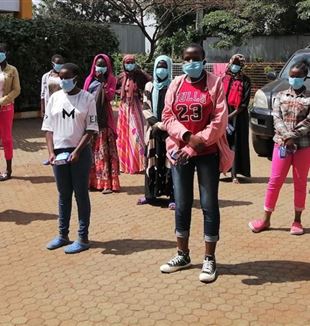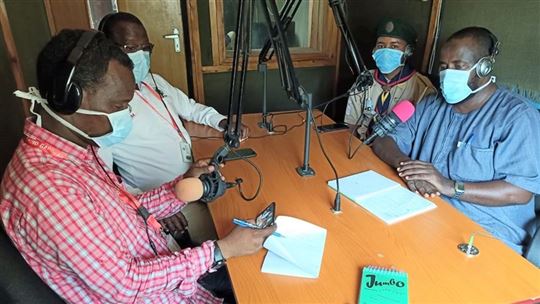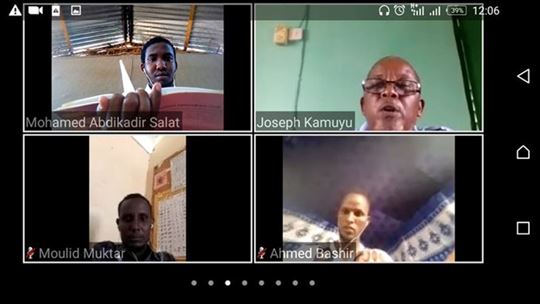
Kenya: The horizon is beyond the village
Lockdown in Nairobi and a nationwide curfew. The fruits of so many years of work that has set a people back in motion within their territory. The first in a series of contributions about the Coronavirus emergency from the areas in which AVSI operates."After South Africa, Kenya is the country with the best health system on the African continent. For a population of 51 million, it only has 150 places in intensive care. When in March we heard what was happening in Italy, we were fearful. What would happen here?" Andrea Bianchessi, coordinator of the AVSI projects for Kenya, Burundi and Rwanda, does not hide his initial fears. To date, things, from the point of view of the pandemic, seem to be going better than expected: there have been 1,200 cases and 52 victims.
"The Government decreed a night curfew throughout the country, from 7 p.m. to 5 a.m., and has imposed a lockdown for the 6 million inhabitants of the metropolitan area of Nairobi. But, as things stand, it seems that this measure is creating even more problems for the population. In poor areas, where people only manage to eat once a day, it has become even more difficult to do so.” If the formal economy, where there are government contracts and permits, is struggling, the informal economy has collapsed. Spontaneous markets in poor neighborhoods, where trade is mainly done at the end of the day, have stopped because of the curfew. Those who brought products from the countryside into the city can no longer do so because they do not have the permits to do so. "The situation is paradoxical, in a country where 8% of the population has AIDS and where people continue to die of malaria,” Bianchessi explains: "I hope that the government will reopen soon, because there is less risk here than in Europe, since 50% of the population are minors."
But AVSI, which is mainly supported by aid from the areas now most affected by Coronavirus - from Northern Italy and Switzerland – has had to roll up its sleeves and face the situation. "I was surprised that no staff member hesitated to find solutions to keep our activities going.” It started, says Bianchessi, with raising awareness, trying to explain what Covid-19 was, what the risks were, and what measures to take. "We exploited technology. In Nairobi, almost everyone has a $10 Chinese smartphone and we exploited the WhatsApp groups, or we called in person to give the information so that fear would not prevail.”
In Dadaab, the refugee camp on the border with Somalia, which now houses 220,000 people, AVSI has worked with scout groups, created in recent years, to reach the population. "In the spirit of Baden-Powell they have move quickly and organized information points where the refugees go to get water. There, they explain the minimum hygiene security measures."
In the slums and rural areas, AVSI coordinates the activities of about 18 savings and credit groups that gather 5,000 people. Within these networks, home production of detergents and handmade masks has been encouraged. "I was very impressed how in these groups, as in the past, sensitivity to help each other has grown. In slums, where there are no public services, help between families has become decisive."
AVSI also collaborates with some schools that it helped found and that are now managed by local staff: Cardinal Otunga in Nairobi, Little Prince in the slum of Kibera and Saint Riccardo Pampuri in the rural area of Mutuati. "Wherever possible, teachers immediately contacted their students through WhatsApp and Zoom. In Mutuati, where there are no smartphones, we met safely twice a week in the school yard to assign homework, pick up it up and return it marked.”
From a distance, the training of the teachers in Dadaab has also continued and a collaboration with some local companies and a large private hospital in the capital has developed, which financed the distribution of masks and health awareness.
AVSI's regional manager also explains that, before the health emergency broke out in Nairobi, they were working on the text of the Pope’s proposed Global Education Pact, which was due to be presented in Rome in May. "Francis uses an African proverb that says: «To educate a child you need a village». I perceive that our experience in these weeks has shown us how this is true. Many people, from the refugee camp to the savings groups, have come together to help the weakest in the face of a common challenge."
Read also - Richard Cabral: "Everything comes down to presence”
The emergency has also revealed, in a certain sense, the fruit of AVSI’s work over the years: "What struck me the most was how, starting with my local staff and our thirty or so partners in the area - schools, congregations, grassroots organizations and cooperatives - all took action to deal with the situation," Bianchessi adds: "I perceive that this attitude is the outcome of the work to which we have invited our interlocutors, which, at all levels, is also an educational proposal and that influences our way of thinking.” He talks about Ciprian, father of 12 children, head of a local organization in Mutuati, in the rural region, who confided his concern for his Italian and Swiss friends. "It should not be taken for granted that the horizon was no longer that of the village, but that of the whole world. And Ciprian is just the first in a long list.”#Coronavirus #Avsi